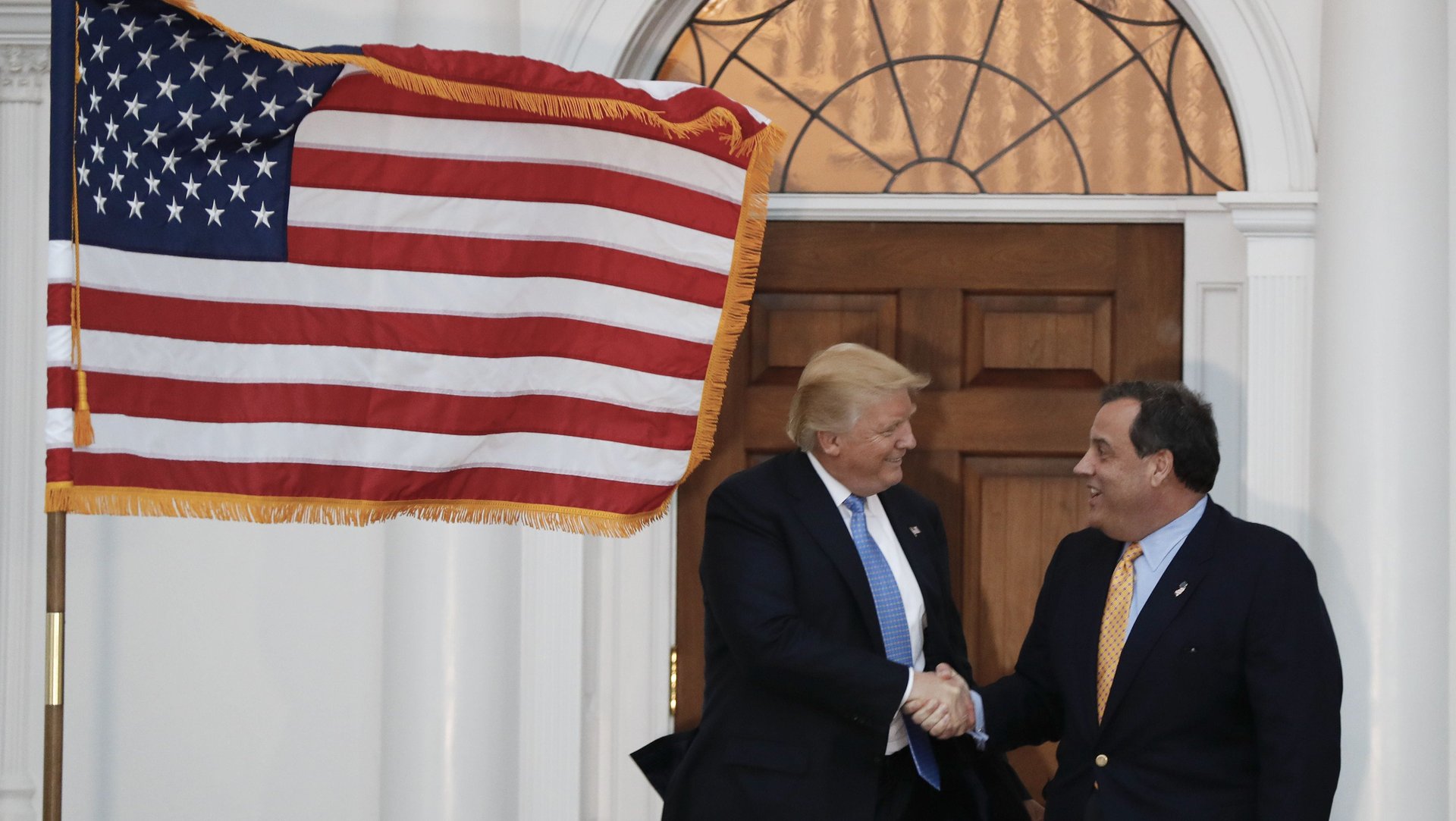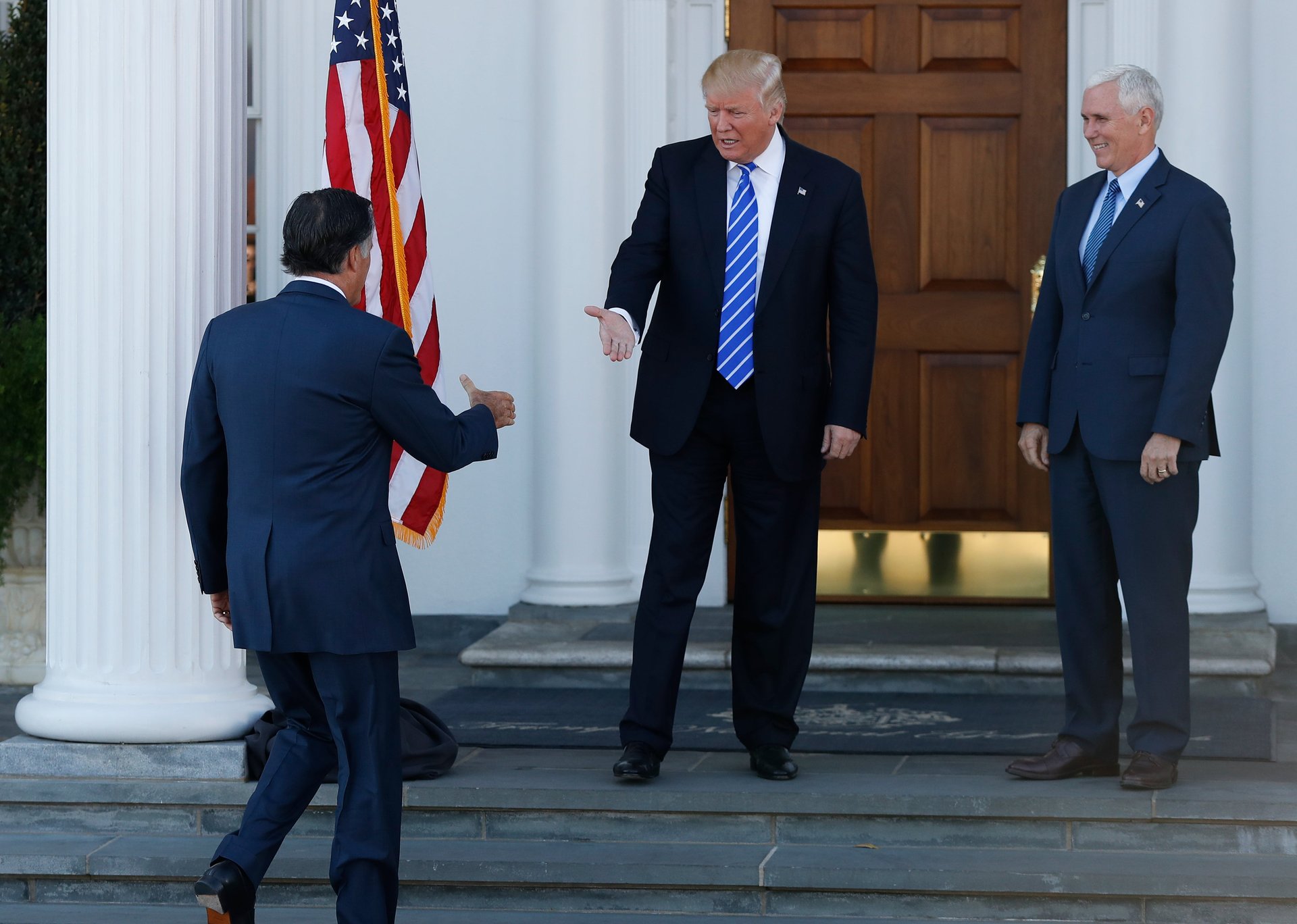Donald Trump is treating a critical, 200-year-old American tradition like a reality TV circus
The process of earnestly and efficiently filling out a presidential cabinet is one of the hallmarks of American democracy, but president-elect Donald Trump doesn’t much care for tradition. Rather than treat the transition as a sacred piece of the democratic process, he is treating it like a special season of The Apprentice—only instead of firing D-list celebrities inside a fictional board room, he’s appointing, or not appointing, the people who will shape US policy for at least the next four years.


The process of earnestly and efficiently filling out a presidential cabinet is one of the hallmarks of American democracy, but president-elect Donald Trump doesn’t much care for tradition. Rather than treat the transition as a sacred piece of the democratic process, he is treating it like a special season of The Apprentice—only instead of firing D-list celebrities inside a fictional board room, he’s appointing, or not appointing, the people who will shape US policy for at least the next four years.
This past weekend, the candidates for positions in his presidential cabinet were marched up the driveway of his ritzy golf club in northern New Jersey, in what the New York times called “made-for-television spectacle.” TV cameras were aimed at the complex’s entrance, as the finalists passed in and out. Trump emerged to greet each visitor, smiling for the cameras as a comically large American flag swirled in the wind.
Noting the game-show aspects of what’s happening may sound as though we’re trivializing the vital work of a government in transition, but Trump already has done so himself with his own words and actions. Since winning the election on Nov. 8, he has tweeted his thoughts on cabinet candidates as if they were reality show contestants, and he both judge and producer.
Even if, behind the scenes, Trump is treating the process with the seriousness it warrants, he evidently wants people to think this isn’t the case. When he’s not tweeting out teases for the next installment of Trump’s Cabinet, he’s using up valuable time attacking the Broadway play Hamilton.
What he’s not doing is treating the transition process with the diligence and discretion of his 44 predecessors. In 2008, when US president Barack Obama asked then-senator Hillary Clinton to be his secretary of state, he did not preview his intentions to the American public with a tweet beforehand. Nor did he parade Clinton around his private residence in a display of authority he had yet to officially acquire.
That Trump turned his transition into a sideshow should not be surprising based on his history in television and the way he ran his campaign. But underneath the performance lies several deeper meanings, ones that are more calculated than a fancy for showmanship.

Trump wants to distract from ongoing scandals
The president-elect’s transition has already been marred by misconduct that, in the minds of voters if not by the law, would disqualify most other elected officials from public office. These are just a few:
- Trump agreed to settle his Trump University lawsuit for $25 million
- He appointed Steve Bannon, famous for leading the racist, sexist “alt-right” website Breitbart, to be his chief strategist
- He’s included his businesswoman daughter, Ivanka, and her husband, Jared Kushner, in conversations with world leaders
- He has kept up his business ties, testing the boundaries of the US constitution he will in two months swear to protect
Trump would very much prefer that the American media focus more on his outlandish cabinet exhibition and less on the unprecedented number of conflicts of interests surrounding his transition. So far, it’s mostly obliged.
Trump is trolling the political left, and also the right
All year long, political pundits and pollsters on both sides of the aisle said that Trump was highly unlikely to win the election. Trump’s transition pageantry is his way of rubbing in his win to these people. Those who opposed him are now forced to watch as he takes his victory lap. (And that may not be the worst of it. Omarosa Manigault, Trump’s director of African American outreach and a former contestant on his Apprentice show, has said that Trump is keeping a list of enemies.)
We know that Trump has already trolled the media on numerous occasions. And we know that he’s admitted to saying provocative things simply to get a rise out of people. And now we know he is also using this transition period to walk back several promises he made while out on the campaign trail.
Trump needs the attention
Though psychologists are not supposed to diagnose people from afar, many have publicly identified Trump as a textbook narcissist. Whether or not they’re right, Trump clearly enjoyed the adulation that comes with running for US president. And, based on the first month of his transition, he’ll love being president even more. He reportedly wants to continue holding large, campaign-esque rallies, even after he’s sworn in.
Imagine, in an alternate universe, president-elect Trump is operating a normal transition. He’s just quietly going about the business of crafting his administration with the same tact and grace demonstrated by Thomas Jefferson 216 years before, when he succeeded John Adams as president and peacefully delivered the nation its first transition of executive power from one party to another. He’s not tweeting previews of cabinet members. He’s not flaunting them in a cavalcade through his private golf club. He’s not turning Manhattan’s Trump Tower, the setting of The Apprentice, into the set of yet another reality show, one with actual stakes.
It doesn’t really compute, does it?
Maybe the showmanship we’ve seen to date is all Trump knows how to do effectively. If so, there’s no reason a perch in the Oval Office has to change this. It already seems pretty clear that the presidency will not prevent Trump from exercising his reality TV muscles—rather, it will strengthen them. He can still tweet. He can still audition contestants for jobs with his administration. He doesn’t even have to split time with Clinton anymore. And while that means more scrutiny on him, it also means more headlines. More cameras. More Trump.